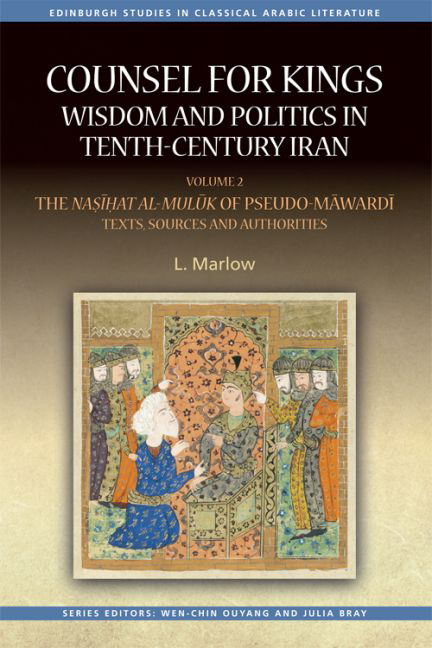 Counsel for Kings: Wisdom and Politics in Tenth-Century Iran
Counsel for Kings: Wisdom and Politics in Tenth-Century Iran 2 - Sources and Authorities: The Living Meaning of Ancient Wisdom
from Part I - The Cultural Landscape
Published online by Cambridge University Press: 07 October 2017
Summary
Pseudo-Māwardī's Sources
Privileged among Pseudo-Māwardī's diverse materials, as he announces in his preface, are the sacred sources of the Qurʾān and the Prophet's sunna. His audience's familiarity with the Qurʾānic text allowed him to cite passages and employ allusions for a combination of structural, conceptual, literary and aesthetic purposes. Pseudo-Māwardī's engagement with the Qurʾānic text is most conspicuous in the hundreds of explicit quotations that appear, often in clusters, at prominent points in his book.
After the Qurʾān and Prophetic sunna (Pseudo-Māwardī cites well over a hundred Prophetic aadīth), the largest number of attributed quotations, by a considerable margin, in Naṣīḥat al-mulūk is fifty-odd citations ascribed to Aristotle, to whom he refers as Arisṭāṭālīs. In the next level of frequency are quotations ascribed to or narratives concerning the Sasanian King Ardashīr (r. c. 224 or 226–242), and the Rightly Guided Caliphs ʿUmar b. al-Khaṭṭāb and ʿAlī b. Abī ʺālib. Following this set of speaker-protagonists in frequency are the Sasanian monarch Sābūr (Shāpūr, r. 239 or 240–270 or 273), the Umayyad Caliph Muʿāwiya, the Abbasid Caliph Abū Jaʿfar al-Man‚ūr and the ascetically inclined theologian ʿAmr b. ʿUbayd (often together), and the caliphs Hārūn al-Rashīd and al-Maʾmūn. In Naṣīḥat al-mulūk, this diverse set of figures convey their instruction in their verbal articulations, reported as aikam, and in their exemplary experience, narrated in the form of akhbār.
Indeed, at his first mention of certain sources, namely, the ‘Testament of Ardashīr’ (ʿAhd Ardashīr), the ‘Testament of Shāpūr’ (ʿAhd Sābūr) and the Aristotelian–Alexandrine epistolary materials, Pseudo-Māwardī affirms their remarkable value. Among other texts, he cites the ‘Testament’ (ʿahd) of an Indian king, on two occasions identified as Sāb.t.r.m; the Āʾīnnāmeh, a work translated, as its title makes clear, from Middle Persian; the collection of fables Kalīla wa-Dimna; and an unidentified Kitāb ʾs.hāmat al-mulūk.
- Type
- Chapter
- Information
- Counsel for Kings: Wisdom and Politics in Tenth-Century IranThe Nasihat al-muluk of Pseudo-Mawardi: Texts, Sources and Authorities, pp. 35 - 70Publisher: Edinburgh University PressPrint publication year: 2016


